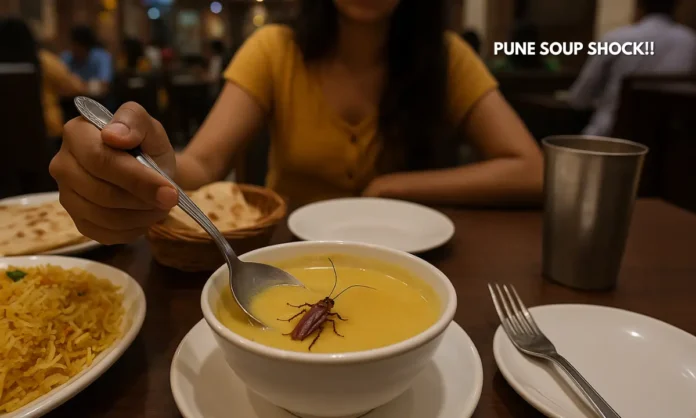Summary
- A woman found a cockroach in her soup at Bhiwandi Darbar Hotel in Pune’s Camp area, prompting police and FDA intervention.
- FDA testing confirmed the soup was unfit for consumption, triggering a criminal case against the restaurant’s owner and manager.
- The case follows another food safety breach in Pune, fueling public outrage and calls for stricter hygiene enforcement in eateries.
When Dining Turns Dangerous: Pune’s Food Safety Alarms Are Ringing
On an otherwise typical evening in Pune’s bustling Camp area, dinner plans turned into a public health wake-up call. A 31-year-old woman, dining with her family at Bhiwandi Darbar Hotel on June 16, discovered a cockroach in her soup—a shocking find that exposed not only a single lapse in hygiene, but a deeper, systemic failure in food safety enforcement across the city.
The incident didn’t end at disgust. The woman’s complaint, ignored by hotel staff, escalated to a police report and a formal FDA investigation. What began as a family dinner now represents a troubling pattern in Pune’s hospitality scene, where growing reports of hazardous food—ranging from cockroaches to shards of glass—are raising public anger and institutional scrutiny.
This article unpacks what happened at Bhiwandi Darbar, explores the broader state of food regulation in Pune, and questions whether city authorities are doing enough to protect what ends up on people’s plates.
#PuneNews #PuneFoodSafety
— NewsDotz (@NewsDotz) July 11, 2025
Shocking Find in Pune Hotel: Cockroach in Soup Sparks Legal Action Against Bhivandi Darbar
A family’s dinner outing in Pune turned into a nightmare when a cockroach was discovered in a bowl of soup served at Hotel Bhivandi Darbar on MG Road. The… pic.twitter.com/fWDLrm3aNs
Food Poisoning by Negligence: What Happened at Bhiwandi Darbar
- The woman found a cockroach in her soup on June 16 around 9 PM.
- Hotel management reportedly dismissed her complaint.
- Police seized the soup, and FDA tests confirmed it was unsafe to consume.
- A criminal FIR was filed against the hotel’s owner and manager.
On the night of June 16, the woman and her family had barely started their dinner at Bhiwandi Darbar Hotel when the unthinkable happened—a cockroach surfaced in her soup bowl. What should have elicited an immediate apology and safety protocol instead met with evasion. The restaurant allegedly refused responsibility, compelling the customer to call the police.
The Lashkar Police arrived on the scene and confiscated the soup, forwarding it to the Food and Drug Administration (FDA) for inspection. When the FDA confirmed the presence of dangerous contaminants, the situation escalated to criminal liability. The police registered a case under sections pertaining to endangerment of life and public health through unsafe food practices.
The FDA’s findings also cast a damning light on the hotel’s hygiene conditions. According to the report, the kitchen lacked even basic sanitation, suggesting that this was not an isolated slip but a habitual neglect of cleanliness norms.
Beyond One Restaurant: A Brewing Crisis in Pune’s Food Safety
- Recent weeks have seen multiple reports of food contamination in Pune.
- An earlier case involved a customer finding glass in a bun maska at Goodluck Café.
- Public trust in restaurant hygiene is eroding fast.
- Experts say municipal oversight has weakened despite rising complaints.
Bhiwandi Darbar’s case isn’t occurring in a vacuum. Just weeks earlier, another customer at the iconic Goodluck Café reported finding a piece of glass in their bun maska. That incident, like the one at Camp, ignited outrage online and was met with similar apathy from the establishment’s staff—until regulatory intervention was forced.
Both cases underscore an uncomfortable reality: Pune’s food safety ecosystem is slipping. The Food Safety and Standards Authority of India (FSSAI) mandates periodic checks and stringent hygiene standards, but their enforcement remains inconsistent. While the Pune Municipal Corporation (PMC) claims routine inspections are carried out, the growing volume of consumer complaints tells a different story.
Food safety experts point to chronic under-staffing in inspection departments and a lack of real-time grievance redressal mechanisms. “We’ve normalised unacceptable conditions in kitchens,” one FDA official noted anonymously, “because there’s almost no fear of penalty unless a story goes viral.”
Public Pressure Mounts: Will This Be a Turning Point?
- The criminal case could set precedent for stronger enforcement.
- PMC is under pressure to mandate surprise inspections across eateries.
- Citizens are demanding digital hygiene ratings and public transparency.
- There is now a push for whistleblower-friendly reporting mechanisms.
The backlash from the Bhiwandi Darbar incident has been swift, with netizens demanding that the PMC conduct surprise inspections at restaurants city-wide. Several advocacy groups have called for a publicly accessible food safety score system—similar to what’s implemented in Singapore and parts of the U.S.—where hygiene ratings are displayed at the entrance of every food establishment.
There’s also rising interest in creating a mobile-based complaint system for food safety, where customers can instantly flag hygiene breaches with image evidence. A proposal for such an app has been pending in the Maharashtra FDA’s digitization wing for over two years, but the recent outrage might finally push it into action.
Meanwhile, Lashkar Police have said that further legal action will proceed under both food safety laws and Indian Penal Code provisions relating to negligence and harm to life.
Serving Caution, Not Just Soup
The incident at Bhiwandi Darbar Hotel is more than a consumer horror story—it’s a stark reflection of the cracks in Pune’s food safety apparatus. With two food safety breaches surfacing in quick succession, public confidence is eroding, and the pressure on civic and regulatory bodies to act is mounting.
If authorities fail to use this moment to establish stricter checks, robust digital reporting tools, and real penalties, then another cockroach—or worse—may not be far from someone’s plate. A city celebrated for its vibrant food culture cannot afford to let that legacy rot from the inside out.


